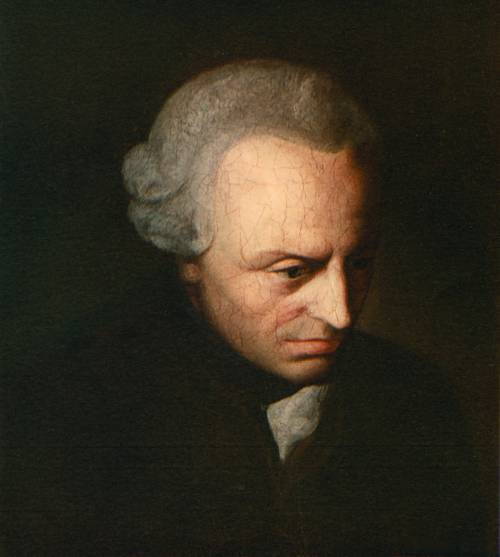
FAQ About Immanuel Kant

Who was Immanuel Kant?
Immanuel Kant was a German philosopher who lived from 1724 to 1804. He is widely regarded as a central figure in modern philosophy, particularly known for his work in epistemology, ethics, and metaphysics. Kant's theories have significantly influenced subsequent philosophical thought, challenging and proposing new ideas about how we perceive the world, the nature of morality, and the foundational principles of human reasoning.

What is the Categorical Imperative in Kant's philosophy?
The Categorical Imperative is a central concept in Kant's moral philosophy. It is a principle that Kant proposed as the fundamental rule of morality, which states that one should act only according to that maxim by which you can at the same time will that it should become a universal law. This means that before taking an action, one should consider whether the principle guiding it could be applied universally without contradiction.

What is 'Critique of Pure Reason' about?
'Critique of Pure Reason,' published in 1781, is one of Kant's most renowned works. In this book, Kant addresses the limitations and scope of human understanding, exploring how we perceive and interpret experiences. He divides the faculties of knowledge into two realms: the phenomenal world (things as they appear to us) and the noumenal world (things as they are in themselves). Kant argues that while we can understand the phenomenal world, the noumenal world is beyond human comprehension.

How did Kant influence modern philosophy?
Immanuel Kant has had a profound impact on modern philosophy, especially through his critical philosophy movement. By challenging the empirical and rationalist traditions with his own theories about perception and knowledge, Kant laid the groundwork for many modern philosophical debates. His ideas, particularly the concepts of autonomy and moral law, continue to influence both ethical theory and practical decision-making.

What are Kant's views on perception?
Kant argued that perception is not a passive process but involves active mental faculties. He proposed that our understanding and perception of the world are structured by innate categories of the mind, such as space and time, which organize sensory data into coherent experiences. This theory suggests that while our experiences are shaped by these mental constructs, we cannot directly perceive the world as it is in itself (the noumenal world).

What does Kant mean by 'noumenal world'?
The 'noumenal world' in Kantian philosophy refers to the reality as it exists independently of human perception—what Kant called 'things in themselves.' According to Kant, humans cannot have direct knowledge of the noumenal world; they can only experience the world as it appears to them, which he termed the 'phenomenal world.' Thus, the noumenal represents a realm beyond human sensory experience and comprehension.

Why is Kant considered a central figure in ethics?
Kant is considered a central figure in ethics primarily due to his development of deontological moral theory, which asserts that actions are morally right based on whether they align with duty and universal laws, rather than their consequences. His notion of the Categorical Imperative requires considering the intentions and principles behind actions, emphasizing moral duties and the autonomy of rational agents. This has had a lasting influence on subsequent ethical theories and discussions.

How does Kant's philosophy address metaphysics?
Kant's contributions to metaphysics involve redefining the field by examining the limits of human knowledge. In his work, he investigates the nature of reality and our ability to know anything about it. He argues that many traditional metaphysical questions cannot be answered definitively due to the limitations of human perception and understanding. Kant thus shifts the focus from trying to describe the external world to understanding the processes and conditions under which we know and perceive.

What is the significance of Kant's 'Critique of Practical Reason'?
Kant's 'Critique of Practical Reason' (1788) is a seminal work in which he explores moral philosophy and the role of reason in ethical decision making. He expands on his concept of the Categorical Imperative, emphasizing the necessity of freedom and autonomy for moral agents. This work represents Kant's attempt to demonstrate that moral laws are derived from rationality itself, not from empirical observation or external dictates, thereby establishing a foundation for ethical behavior based on reason and duty.

What was Kant's influence on epistemology?
Kant revolutionized epistemology by arguing that knowledge arises from the interaction between sensory data and the mind's inherent structures. He introduced the idea of a 'Copernican Revolution' in philosophy, suggesting that knowledge conforms to the conditions of the perceiver, rather than the world conforming to an external reality. This approach greatly influenced later philosophical movements, such as German idealism and phenomenology, by highlighting the subjective elements of human experience and understanding.

What is Kant's theory of aesthetics?
Kant's theory of aesthetics, primarily outlined in his 'Critique of Judgment,' proposes that aesthetic judgment is subjective but possesses a universal communicability. He argues that beauty is not a property of objects themselves but a subjective experience that arises from the harmonious interplay between the faculties of imagination and understanding. This theory indicates that aesthetic judgments, though subjective, have a certain universality because they are based on shared human cognitive structures.

How did Kant's philosophy challenge previous philosophical traditions?
Kant's philosophy challenged both the rationalist and empiricist traditions that preceded him. Against the rationalists, he argued that not all knowledge arises from pure reason; against the empiricists, he contended that our understanding of experience is mediated by innate mental structures. Kant introduced a new approach by asserting that the mind plays an active role in shaping experience, thereby changing the focus of epistemology from the external world to the internal structures and processes of cognition.

What is meant by Kant's 'Transcendental Idealism'?
'Transcendental Idealism' is Kant's theory that humans can only know objects as they appear to us, not as they exist independently. According to Kant, our experiences of the world are mediated through the mental frameworks that structure our perceptions. This means that the reality of objects themselves (the noumenal realm) is inaccessible to us, and we are limited to experiencing the phenomenal world that our minds shape.

In what way did Kant influence political philosophy?
Kant had a notable influence on political philosophy, particularly through his writings on ethics and autonomy, which translated into concepts of political justice and the rights of individuals. His ideas about freedom and rational autonomy laid intellectual groundwork for liberal political theories, advocating for a society governed by principles of equal rights and justice, with an emphasis on the moral autonomy of individuals as foundational to a just society.

What role does autonomy play in Kant's moral philosophy?
Autonomy is a core concept in Kant's moral philosophy, signifying the ability of rational agents to self-legislate moral law. Kant believed that genuine morality arises from acting according to laws one gives oneself, rather than conforming to external rules or influences. This emphasis on autonomy underscores his belief in the dignity and inherent worth of individuals as rational and moral agents, free to determine their own ethical paths guided by reason.

How does Kant's philosophy relate to science?
Kant's philosophy significantly relates to science through his examination of how scientific knowledge is possible. In his 'Critique of Pure Reason,' he explores the presuppositions and limitations of human knowledge, which includes understanding scientific phenomena. Kant argues that scientific inquiry is necessarily structured by the mental categories through which we process empirical data, making scientific knowledge both a product of experience and a reflection of the mind's inherent structures.

Why is Kant's moral philosophy considered deontological?
Kant's moral philosophy is considered deontological because it emphasizes duty and the inherent morality of actions over the consequences they produce. In a deontological framework, the morality of an action is judged based on its adherence to universal moral laws or duties, as outlined in the Categorical Imperative, rather than its effects. Kant's insistence on acting in accordance with duty and principle sets his ethical theory apart from consequentialist approaches that focus on outcomes.

How did Kant view religion in relation to ethics?
Kant viewed religion as subordinate to ethical principles derived from reason. He argued that true religion is grounded in moral laws accessible to human reason, rather than in ritual or indulgence. He believed that while religious doctrines can inspire and reinforce moral behavior, morality itself is autonomous and based on rational human principles independent of religious authority. This perspective encourages a moral framework that prioritizes ethical rationality over adherence to religious dogma.

What is Kant's 'Copernican Revolution' in philosophy?
Kant's 'Copernican Revolution' in philosophy refers to his radical shift in understanding the nature of knowledge, suggesting that instead of our knowledge conforming to external objects, it is the objects that conform to our perception and understanding. This means that while we engage with the external world, it is shaped by the cognitive faculties inherent to human beings. This shift moved the philosophical focus from the objective world to the subjective experience and the conditions that allow for understanding.

Can you explain Kant's concept of 'Duty' in ethics?
Kant's concept of duty is central to his deontological ethics, which stipulates that moral actions are those done out of respect for moral law, irrespective of inclinations or consequences. For Kant, an action has moral worth only when it is performed from duty, meaning that the motivating factor should be adherence to universal principles determined by reason. Duty, therefore, becomes the guiding force behind ethical behavior, reflecting one's commitment to acting in accordance with moral obligations.
